pep人教版小学英语 can could语法习题合辑 (16)
can与could的用法详解及情态动词有关习题

c a n与c o u l d的用法详解及情态动词有关习题Company Document number:WTUT-WT88Y-W8BBGB-BWYTT-19998can与could的用法详解一、表示能力(1)表示现在的能力,用can:My sister can drive. 我妹妹会开车。
Everyone here can speak English. 这儿人人会说英语。
(2)表示将来的能力,通常不用can或could,而用be able to的将来时态:I’ll be able to speak French in another few months. 再过几个月我就会讲法语了。
One day people will be able to go to the moon on holiday. 总有一天人们可以到月球上去度假。
但是,若表示现在决定将来是否有能力做某事,则可用 can:Can you come to the party tomorrow 你明天能来参加我们的聚会吗(3)表示过去的能力,有时可用could,有时不能用could,具体应注意以下几点:①若表示过去一般的能力(即想做某事就随时可做某事的能力),可用could:Could you speak English then 那时候你会说英语吗②若表示过去的特定能力(即在过去特定场合做某事的能力),则不能用could,而用w as (were) able to do sth,或用 managed to do sth,或用 succeeded in doing sth 等。
He studied hard and was able to pass the exam. 他学习很努力,所以考试能及格。
At last he succeeded in solving the problem. 他终于把那个问题解决了。
【注】could 不用来表示过去特定能力通常只限于肯定句,否定句或疑问句中,它则可以表示过去特定的能力:I managed to find the street, but I couldn’t find her house. 我想法找到了那条街,但没找到她的房子。
人教版PEP小学英语语法大全及复习练习(附答案)
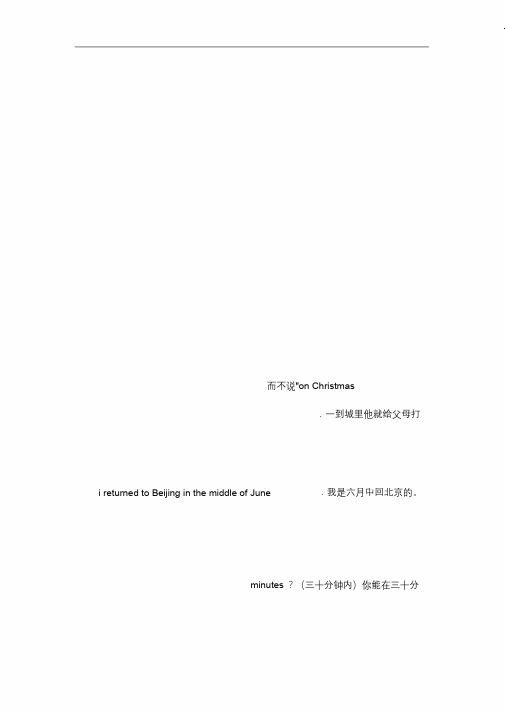
而不说"on Christmas.一到城里他就给父母打i returned to Beijing in the middle of June .我是六月中回北京的。
minutes ?(三十分钟内)你能在三十分by noon,everybody had(will have)arrived there .by noon,everybody一般现在时基本用法介绍3. 表示客观现实。
如:The earth goes around the sun.一般现在时的构成动词原形(+其它) 。
如:watch-watches, go-goeswatch______ plant_______ fly ________1. He often ________(have) dinner at home.2. Daniel and Tommy _______(be) in Class One.3. We _______(not watch) TV on Monday.10. Simon and Daniel like going skating.(________________________________________________________________________ 2.现在进行时的肯定句基本结构为be+动词ing.3.现在进行时的否定句在be 后加not 。
4.现在进行时的一般疑问句把be 动词调到句首。
5.现在进行时的特殊疑问的基本结构为:疑问词不达意+ be + 主语+ 动词ing?但疑问词当主语时其结构为:疑问词不达意+ be + 动词ing?动词加ing 的变化规则现在进行时专项练习:go_________ like________2.The students are cleaning the classroom . (改一般疑问句并作肯定和否定回答)对划线部分进行提问) 二、基本结构:①be going to + do ;Nancy ________ going to go camping.6. I ’ll go and join them. (改否定)I _______ go ______ join them.7. I ’m going to get up at 6:30 tomorrow.特殊疑问句:⑴疑问词+did+主语+动词原形?3. They _______ glad to see each other last month.4. Helen and Nancy ________ good friends.5. The little dog _____ two years old this year.3. We _______ (have) a party last Halloween.1. Su Hai took some photos at the Sports day.Name ____________ No. ______ Date __________一、用be 动词的适当形式填空1. I ______ (watch) a cartoon on Saturday.’s birthday last Friday.Name ____________ No. ______ Date __________一、用动词的适当形式填空1. It _____ (be) the 2nd of November yesterday.Mr White ________ (go) to his office by car._________________________________________________________来修饰表示程度。
初一英语情态动词can与could用法单选题30题

初一英语情态动词can与could用法单选题30题1.I ____ play basketball very well.A.canB.couldC.mayD.must答案:A。
“can”表示能力,“我能打篮球打得很好”,符合语境。
“could”是“can”的过去式,这里没有过去的时间状语,不合适。
“may”表示可能,“must”表示必须,都不符合表示能力的意思。
2.She ____ swim when she was five years old.A.canB.couldC.mayD.must答案:B。
“could”表示过去的能力,“她五岁的时候能游泳”,有过去的时间状语,用“could”合适。
“can”表示现在的能力,这里不合适。
“may”表示可能,“must”表示必须,都不符合表示过去能力的意思。
3.He ____ draw beautiful pictures.A.canB.couldC.mayD.must答案:A。
“can”表示现在的能力,“他能画漂亮的画”,符合语境。
“could”是“can”的过去式,这里没有过去的时间状语,不合适。
“may”表示可能,“must”表示必须,都不符合表示能力的意思。
4.We ____ sing many English songs.A.canB.couldC.mayD.must答案:A。
“can”表示能力,“我们能唱很多英文歌”,符合语境。
“could”是“can”的过去式,这里没有过去的时间状语,不合适。
“may”表示可能,“must”表示必须,都不符合表示能力的意思。
5.They ____ speak French fluently.A.canB.couldC.mayD.must答案:A。
“can”表示能力,“他们能流利地说法语”,符合语境。
“could”是“can”的过去式,这里没有过去的时间状语,不合适。
“may”表示可能,“must”表示必须,都不符合表示能力的意思。
Unit 3情态动词could(重点语法提升练)-八年级英语下册单元模块满分必刷题(人教版)

2022-2023学年八年级英语下册单元模块满分必刷题(人教版)Unit 3 Could you please clean your room【刷语法】(重点语法提升练)情态动词couldcould的用法:(1)can的过去式,意为“ 能、会”,表示过去的能力。
如:He could write poems when he was 10.(2)could在疑问句中,表示委婉的语气,此时 could 没有过去式的意思。
Could I use your pen? 我能用一下你的钢笔吗? —Yes, you can.可以。
一、单项选择1.(2022春·山东菏泽·八年级统考期中)—Mom, ________ I invite my friends to a party?—Sorry, you ________. You have a test on Monday.A.could; can’t B.can; needn’t C.must; couldn’t2.(2022春·四川成都·八年级校考期中)—Excuse me, I’m new here. I can’t find my hotel. —Sorry, I’m new, too. You ________ ask the cleaner over there. Maybe he can help you.A.could B.will C.must3.(2022春·河北石家庄·八年级统考期中)— ________ I have some water?—Sure, here you are.A.Must B.Should C.Could D.Mustn’t4.(2023春·全国·八年级专题练习)________ you tell me how to get to the post office?A.Must B.Need C.Could D.Should5.(2023春·八年级单元测试)Tom ________ lift the heavy box by himself, so he asked his friend for help.A.mustn’t B.needn’t C.couldn’t D.shouldn’t6.(2023春·八年级课时练习)________ you please close the window? It’s a little bit cold.A.Must B.Should C.Need D.Could7.(2022春·江西吉安·八年级统考期末)—Could you please help me fold the clothes, Tom?—Sure, I ________, Uncle Lee. I ________ fold my own T-shirts at the age of four.A.can; cou1d B.could; could C.can; can D.could; can8.(2022春·江西吉安·八年级统考期末)— __________ I go to the movie tonight?— No. You must study for your English test tomorrow.A.Must B.Need C.Should D.Could9.(2022春·吉林长春·八年级统考期末)—________ you please not throw the rubbish everywhere? —Sorry, I will pick it up.A.Can B.Must C.Could D.May10.(2022春·辽宁丹东·八年级统考期末)—Could I use your computer?—________ I’m going to use it myself.A.Sorry, you can’t. B.Sure, you can. C.No, you couldn’t. D.No problem.11.(2022春·湖北襄阳·八年级统考期末)—Could we go to the bookshop together? I will buy a classic called Journey to the West.—Sorry, I________. I have to go home to look after my sick grandma.A.couldn’t B.needn’t C.mustn’t D.can’t12.(2022春·北京海淀·八年级统考期末)—________ you explain to me how to do this math problem, Tom?—Sure, no problem.A.Must B.Could C.Should D.May13.(2022春·湖南岳阳·八年级统考期末)—I am so bored. What should I do?—There is a good film on tonight. You ________ watch it.A.need B.could C.would14.(2022春·江西抚州·八年级统考期末)—_________ I play soccer this afternoon, Mom?—No, you can’t. You must prepare for your English exam.A.Must B.Should C.Could D.Need15.(2022春·重庆梁平·八年级统考期末)Alice ________ play the piano when she was five years old. A.can B.could C.may D.might16.(2023春·全国·八年级专题练习)—Could you please come to the library with me tomorrow?—Sorry, I ________. I’ll have a piano lesson.A.mustn’t B.needn’t C.couldn’t D.can’t17.(2022春·四川遂宁·八年级统考期末)—Could you please do the dishes?—No, I . I cut myfinger and I’m trying not to get it wet.A.could B.can C.couldn’t D.can’t18.(2022春·湖南怀化·八年级统考期末)—________ you please turn on the TV? I want to watch the lessons taught by Zhai Zhigang, WangYaping and Ye Guangfu from the space.—Sure, no problem.A.Could B.Must C.Should19.(2022春·河北廊坊·八年级统考期末)— Cathy, ________ you please sweep the floor? I’m busy making dinner now.— Sure, Mom. I’ll do that right away.A.could B.must C.need D.should20.(2020春·山东济南·八年级统考期末)— Mum, __________ I use your computer?— Sorry, I’m going to work on it now.A.could B.must C.need D.should21.(2022春·山东·八年级统考期末)—Excuse me, _________ I have the seat by the window?—Sorry. Someone has taken it.A.can B.could C.need D.must22.(2022·全国·八年级假期作业)During the Tang dynasty (唐朝), nearly everything produced in the world ________ on the streets of Chang’an.A.is found B.has been found C.will be found D.could be found 23.(2022秋·八年级单元测试)—Kim, ________ you please order two tickets for the movie Breaking Through?—Yes, sure. I’ll order them online.A.could B.must C.need D.should24.(2022春·山东滨州·八年级统考期末)—________ I share the table with you?—Of course you ________. Sit here, please.A.Could; could B.May; could C.Could; can D.Can; should25.(2021春·湖北武汉·八年级统考期末)When I lived at home, I __________ watch TV whenever I wanted to.A.may B.could C.must D.should26.(2022春·山东济南·八年级统考期中)—Mom, ________ you please buy some snacks?—Sure.A.must B.may C.could D.should27.(2021春·湖北武汉·八年级校联考阶段练习)—I would like to help sick kids.—I think we ________ help cheer the children up in hospital.A.will B.could C.may D.must28.(2022秋·八年级单元测试)—Mom, ________ I go out for dinner with my friends?—Sure, but you ________ finish your homework first.A.may, could B.could, must C.can, mustn’t D.could, can29.(2021春·黑龙江鹤岗·八年级统考期末)—Mom, could I hang out with my friends tonight?—________. It’s not very safe.A.Yes, you could B.No, you couldn’tC.Yes, please D.Sorry, you can’t30.(2022秋·河北保定·八年级统考期末)My son ________ ride a bike when he was only ten years old. A.can B.able C.may D.could31.(2022春·河北石家庄·八年级石家庄市第二十七中学校考期中)—________ I go to the movies with Anna tonight, mom?—Of course you ________. But don’t stay out too late.A.Could, can B.Should, should C.Could, would D.Can, should32.(2022春·山东济南·八年级校考期中)—Could the boy read books when he was four?—No, he _________.A.can’t B.couldn’t C.didn’t D.doesn’t33.(2022春·河北石家庄·八年级统考期中)—What ________ I do when my parents don’t agree with me?—You ________ talk with them and let them know your thought.A.should, could B.should, must C.could, shouldn’t D.could, couldn’t 34.(2021春·河北石家庄·八年级统考期末)We will hold an English party next week. _________ you come to the party?A.Must B.Should C.Could D.May35.(2022·全国·八年级假期作业)Jane ________ perform ballet at all when she was a little girl, but she ________ do it now.A.could; can B.couldn’t; can C.could; can’t D.couldn’t; can’t36.(2022春·河北石家庄·八年级校考期中)—________ I use the computer, Mom?—Yes, you can. But you have to finish your homework first.A.Should B.Could C.Must D.Would37.(2021春·安徽滁州·八年级统考阶段练习)—Mendy is still angry with me. What should I do?—Maybe you ________ write a letter to say sorry to her.A.must B.mustn’t C.couldn’t D.could38.(2021春·山东济南·八年级校联考期中)— Could I use your car?— Sorry, you _________. I have to go out.A.could B.can C.couldn’t D.can’t39.(2021春·山东济南·八年级统考期中)— Mom, ________ I play computer games?— Yes, you can. But you have to finish your homework first.A.must B.could C.will D.need40.(2022·全国·八年级假期作业)— ________ you please tell me your pen pal’s name?— Sure. His name is Jeff.A.Do B.Could C.Does D.Are参考答案:1.A【详解】句意:——妈妈,我可以邀请我的朋友参加聚会吗?——对不起,你不能。
2024年版人教版三年级上册英语连词成句练习(人教PEP)附答案

3.a,I,cat,have(.)
10. is,an,It,elephant(.)
17.are,We,big(.)
I have a cat.
It is an elephant.
We are big.
4.rabbits,I,like(.)
11.tall,The,is,giraffe(!) 18.big,Whale,are,sharks,too(.)
This is my grandpa.
Is that your brother?
Families are different.
3.you,to,Nice,meet(.)
10. is,family,big,My(.) 17.play,I,my,with,brother(.)
Nice to meet you.
7. have,You,big,family,a(.) 14.play,me,They,with,can(.)
新版 PEP 人教三上连词成句专项 (Unit2)
姓名:__________ 班级:__________
1.is,my,This,friend(.)
8. is,It,cousin,my (.)
15.small,are,family,Some (.)
2.my,is,grandpa,This(.) 9.that,Is,brother,your(?) 16.are,Families,different(.)
3. you,to,Nice,meet(.)
10. is,family,big,My(.) 17.play,I,my,with,brother(.)
I help and share.
My new friend is Zoom.
can与could的用法详解及情态动词有关习题
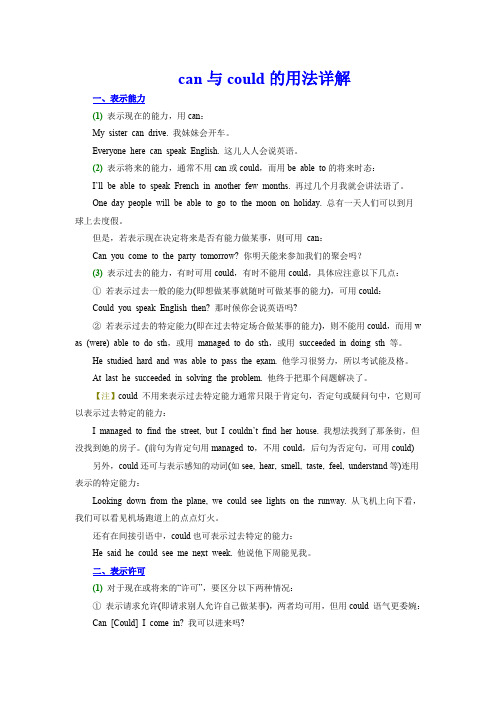
can与could的用法详解一、表示能力(1)表示现在的能力,用can:My sister can drive. 我妹妹会开车。
Everyone here can speak English. 这儿人人会说英语。
(2)表示将来的能力,通常不用can或could,而用be able to的将来时态:I’ll be able to speak French in another few months. 再过几个月我就会讲法语了。
One day people will be able to go to the moon on holiday. 总有一天人们可以到月球上去度假。
但是,若表示现在决定将来是否有能力做某事,则可用can:Can you come to the party tomorrow? 你明天能来参加我们的聚会吗?(3)表示过去的能力,有时可用could,有时不能用could,具体应注意以下几点:①若表示过去一般的能力(即想做某事就随时可做某事的能力),可用could:Could you speak English then? 那时候你会说英语吗?②若表示过去的特定能力(即在过去特定场合做某事的能力),则不能用could,而用w as (were) able to do sth,或用managed to do sth,或用succeeded in doing sth 等。
He studied hard and was able to pass the exam. 他学习很努力,所以考试能及格。
At last he succeeded in solving the problem. 他终于把那个问题解决了。
【注】could 不用来表示过去特定能力通常只限于肯定句,否定句或疑问句中,它则可以表示过去特定的能力:I managed to find the street, but I couldn’t find her house. 我想法找到了那条街,但没找到她的房子。
六年级科教版人教PEP版英语上学期句型转换教学知识练习
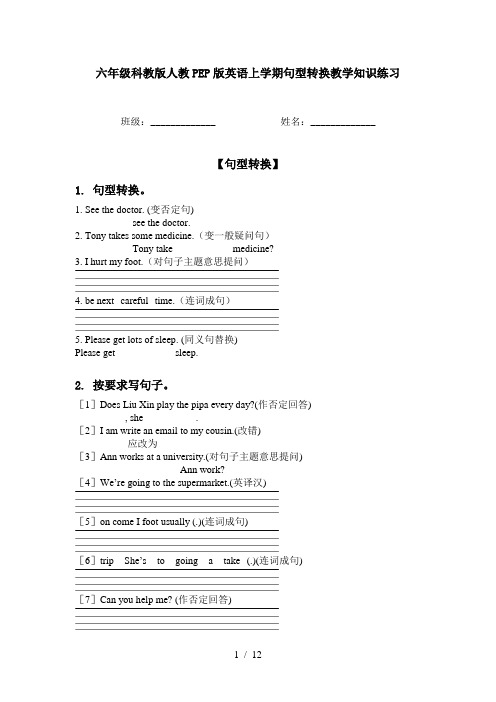
六年级科教版人教PEP版英语上学期句型转换教学知识练习班级:_____________ 姓名:_____________【句型转换】1. 句型转换。
1. See the doctor. (变否定句)___________ see the doctor.2. Tony takes some medicine.(变一般疑问句)___________ Tony take ___________ medicine?3. I hurt my foot.(对句子主题意思提问)4. be next careful time.(连词成句)5. Please get lots of sleep. (同义句替换)Please get ___________ sleep.2. 按要求写句子。
[1]Does Liu Xin play the pipa every day?(作否定回答)__________, she __________.[2]I am write an email to my cousin.(改错)__________ 应改为__________[3]Ann works at a university.(对句子主题意思提问)__________ __________ Ann work?[4]We’re going to the supermarket.(英译汉)[5]on come I foot usually (.)(连词成句)[6]trip She’s to going a take (.)(连词成句)[7]Can you help me? (作否定回答)3. 按要求完成句子。
The mouse made a big hole in the net with his teeth.(1)写出同义句 __________________(2)对a划线提问 __________________(3)对The mouse划线提问 ________________(4)对The划线提问 __________________(5)对with his teeth划线提问 __________________(6)对his teeth划线提问 ____________________4. 按要求写句子。
人教版小学英语语法讲解及习题
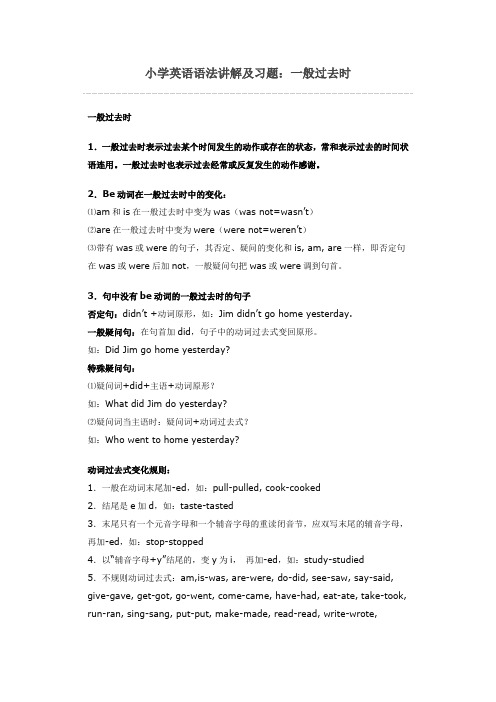
小学英语语法讲解及习题:一般过去时一般过去时1.一般过去时表示过去某个时间发生的动作或存在的状态,常和表示过去的时间状语连用。
一般过去时也表示过去经常或反复发生的动作感谢。
2.Be动词在一般过去时中的变化:⑴am和is在一般过去时中变为was(was not=wasn’t)⑵are在一般过去时中变为were(were not=weren’t)⑶带有was或were的句子,其否定、疑问的变化和is, am, are一样,即否定句在was或were后加not,一般疑问句把was或were调到句首。
3.句中没有be动词的一般过去时的句子否定句:didn’t +动词原形,如:Jim didn’t go home yesterday.一般疑问句:在句首加did,句子中的动词过去式变回原形。
如:Did Jim go home yesterday?特殊疑问句:⑴疑问词+did+主语+动词原形?如:What did Jim do yesterday?⑵疑问词当主语时:疑问词+动词过去式?如:Who went to home yesterday?动词过去式变化规则:1.一般在动词末尾加-ed,如:pull-pulled, cook-cooked2.结尾是e加d,如:taste-tasted3.末尾只有一个元音字母和一个辅音字母的重读闭音节,应双写末尾的辅音字母,再加-ed,如:stop-stopped4.以“辅音字母+y”结尾的,变y为i,再加-ed,如:study-studied5.不规则动词过去式:am,is-was, are-were, do-did, see-saw, say-said, give-gave, get-got, go-went, come-came, have-had, eat-ate, take-took, run-ran, sing-sang, put-put, make-made, read-read, write-wrote,draw-drew, drink-drank, fly-flew, ride-rode, speak-spoke, sweep-swept, swim-swam, sit-sat过去时练习写出下列动词的过去式is\am_______ fly_______ plant_______ are_______drink_______ play_______ go_______ make_______does_______ dance_______ worry________ ask_______taste_______ eat_______ draw________ put_______throw_______ kick_______ pass_______ do_______Be动词的过去时练习(1)一、用be动词的适当形式填空1. I _______ at school just now.2. He ________ at the camp last week.3. We ________ students two years ago.4. They ________ on the farm a moment ago.5. Yang Ling ________ eleven years old last year.6. There ________ an apple on the plate yesterday.7. There ________ some milk in the fridge on Sunday.8. The mobile phone _______ on the sofa yesterday evening.二、句型转换1. It was exciting.否定句:______________________________________________一般疑问句:___________________________________________肯、否定回答:__________________________________________2. All the students were very excited.否定句:______________________________________________一般疑问句:___________________________________________肯、否定回答:__________________________________________3. They were in his pocket.否定句:______________________________________________一般疑问句:___________________________________________肯、否定回答:__________________________________________Be动词的过去时练习(2)一、用be动词的适当形式填空1. I _______ an English teacher now.2. She _______ happy yesterday.3. They _______ glad to see each other last month.4. Helen and Nancy _______ good friends.5. The little dog _______ two years old this year.6. Look, there _______ lots of grapes here.7. There _______ a sign on the chair on Monday..8. Today _______ the second of June. Yesterday _______ the first of June. It _______ Children’s Day. All the students _______ very excited.二、句型转换1. There was a car in front of the house just now.否定句:______________________________________________一般疑问句:___________________________________________肯、否定回答:__________________________________________三、中译英1.我的故事书刚才还在手表旁边。
(完整版)小学英语can句型练习题

(完整版)小学英语can句型练习题五年级Can 用法练习将下列句子变成否定句和一般疑问句并作肯定及否定回答Example:Zoom can eat .Zoom can’t eat.(否定句)Can Zoom run ?(一般疑问句)Yes , he can .(肯定回答)No,he can’t.(否定回答)1、Miss Luo can play ping-pong.________________________________________________________________ _______________________________________________________________ _____________________________________________________________________________________________________________________________ _2、They can clean the floor.________________________________________________________________ ______________________________________________________________ ______________________________________________________________ ________________________________________________________________ _3、Li Mei can make the bed .________________________________________________________________ _______________________________________________________________ ______________________________________________________________ ________________________________________________________________4、Robin can cook today.________________________________________________________________ _____________________________________________________________________________________________________________________________ ________________________________________________________________补充:以be动词(am, is, are)和助动词(do,can)等开头的句子叫做一般疑问句。
(完整版)PEP人教版小学英语语法及习题(可编辑修改word版)
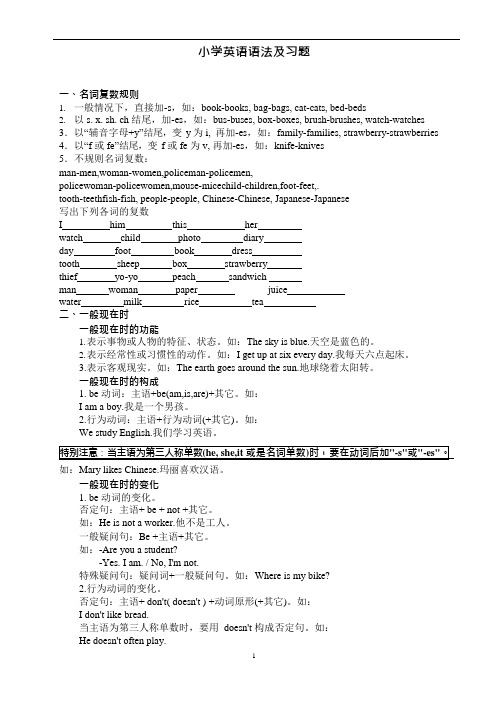
小学英语语法及习题一、名词复数规则1.一般情况下,直接加-s,如:book-books, bag-bags, cat-cats, bed-beds2.以s. x. sh. ch 结尾,加-es,如:bus-buses, box-boxes, brush-brushes, watch-watches 3.以“辅音字母+y”结尾,变y 为i, 再加-es,如:family-families, strawberry-strawberries 4.以“f 或fe”结尾,变f 或fe 为v, 再加-es,如:knife-knives5.不规则名词复数:man-men,woman-women,policeman-policemen,policewoman-policewomen,mouse-micechild-children,foot-feet,.tooth-teethfish-fish, people-people, Chinese-Chinese, Japanese-Japanese写出下列各词的复数I him this herwatch child photo diaryday foot book dresstooth sheep box strawberrythief yo-yo peach sandwichman woman paper juicewater milk rice tea二、一般现在时一般现在时的功能1.表示事物或人物的特征、状态。
如:The sky is blue.天空是蓝色的。
2.表示经常性或习惯性的动作。
如:I get up at six every day.我每天六点起床。
3.表示客观现实。
如:The earth goes around the sun.地球绕着太阳转。
一般现在时的构成1.be 动词:主语+be(am,is,are)+其它。
如:I am a boy.我是一个男孩。
人教PEP版四年级英语上学期句型转换专项课间习题
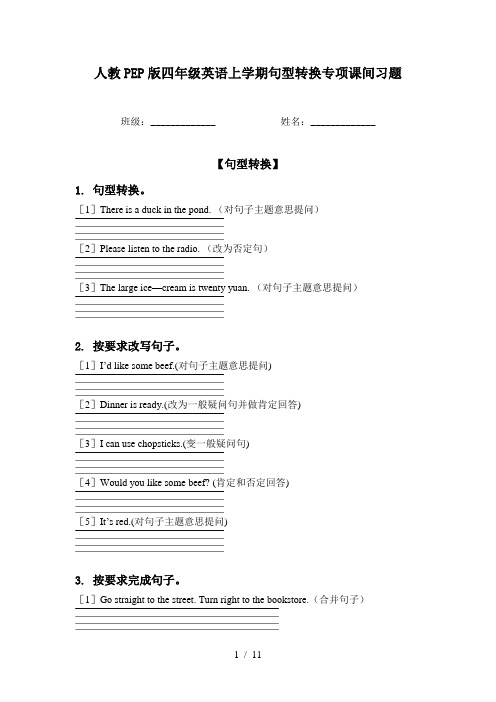
人教PEP版四年级英语上学期句型转换专项课间习题班级:_____________ 姓名:_____________【句型转换】1. 句型转换。
[1]There is a duck in the pond. (对句子主题意思提问)[2]Please listen to the radio. (改为否定句)[3]The large ice—cream is twenty yuan. (对句子主题意思提问)2. 按要求改写句子。
[1]I’d like some beef.(对句子主题意思提问)[2]Dinner is ready.(改为一般疑问句并做肯定回答)[3]I can use chopsticks.(变一般疑问句)[4]Would you like some beef? (肯定和否定回答)[5]It’s red.(对句子主题意思提问)3. 按要求完成句子。
[1]Go straight to the street. Turn right to the bookstore.(合并句子)[2]The bookstore is behind the bank.(改为一般疑问句)[3]希望你旅途愉快。
[4]tell, me, to, subway, the, way, could, you,(连词成句)[5]I want to go to the subway.(对句子主题意思提问)[6]I like reading books.(对句子主题意思提问)4. 根据题意变句型。
[1]This mouse likes to eat bread. (改复数句)____________ ______________ ____________ to eat _____________. [2]The ladybird is small. (改为否定句,但意思不变)The ladybird ___________ ____________.[3]I like nice flowers. (I改成Kitty)Kitty ___________ nice flowers.[4]My aunt is an English teacher. (对句子主题意思提问)What ___________ your aunt __________?[5]The cat is angry and tired. (对句子主题意思提问)_____________ ____________ the cat _____________?5. 按要求完成下列各题。
初一英语情态动词can与could用法单选题30题

初一英语情态动词can与could用法单选题30题1. My sister can play the piano very well, but I _____.A. canB. can'tC. couldD. couldn't答案:B。
本题考查can 表示能力的否定形式。
A 选项can 表示肯定,与but 转折不符;C 选项could 是can 的过去式,不符合语境;D 选项couldn't 是过去式的否定,也不符合;B 选项can't 表示“不能”,符合语境。
2. In my family, my father can cook delicious food, but my mother _____.A. canB. can'tC. couldD. couldn't答案:B。
此题同样考查can 表示能力的否定。
A 选项can 表示肯定,不符合but 后的转折;C 选项could 是过去式,时态错误;D 选项couldn't 是过去式的否定,也不正确;B 选项can't 符合题意,表示否定。
3. At school, my friend can speak English fluently, but I _____.A. canB. can'tC. couldD. couldn't答案:B。
本题重点是can 表示能力的否定运用。
A 选项can 为肯定,不符合转折;C 选项could 时态不对;D 选项couldn't 时态和意思都不符;B 选项can't 表示“不会”,符合此处语境。
4. My brother can swim very fast, but I _____.A. canB. can'tC. couldD. couldn't答案:B。
这道题考查can 表示能力时的否定形式。
七年级英语情态动词can和could辨析单选题30题
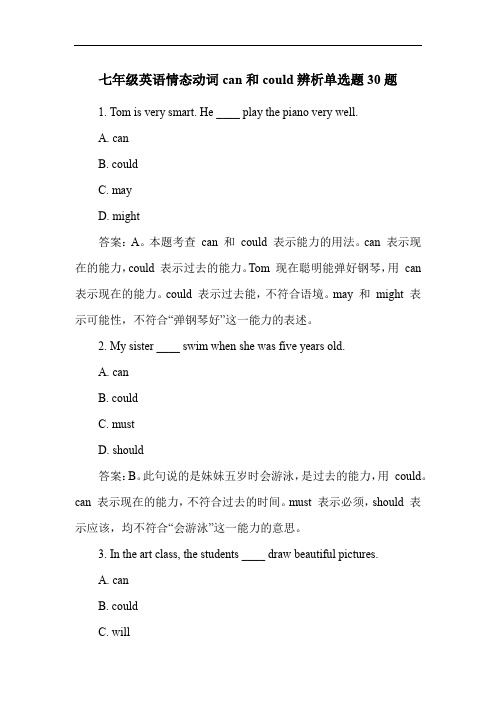
七年级英语情态动词can和could辨析单选题30题1. Tom is very smart. He ____ play the piano very well.A. canB. couldC. mayD. might答案:A。
本题考查can 和could 表示能力的用法。
can 表示现在的能力,could 表示过去的能力。
Tom 现在聪明能弹好钢琴,用can 表示现在的能力。
could 表示过去能,不符合语境。
may 和might 表示可能性,不符合“弹钢琴好”这一能力的表述。
2. My sister ____ swim when she was five years old.A. canB. couldC. mustD. should答案:B。
此句说的是妹妹五岁时会游泳,是过去的能力,用could。
can 表示现在的能力,不符合过去的时间。
must 表示必须,should 表示应该,均不符合“会游泳”这一能力的意思。
3. In the art class, the students ____ draw beautiful pictures.A. canB. couldC. will答案:A。
在美术课上,学生们能够画出漂亮的画,说的是现在的能力,用can。
could 表示过去的能力,will 表示将要,would 表示过去将要,均不符合现在的能力这一语境。
4. My father ____ repair the bike by himself.A. canB. couldC. needD. dare答案:A。
我父亲能自己修自行车,说的是现在的能力,用can。
could 表示过去能,need 需要,dare 敢,均不符合“修自行车”这一能力的表述。
5. The little boy ____ count from one to ten.A. canB. couldC. mayD. must答案:A。
三年级英语情态动词特殊用法单选题40题

三年级英语情态动词特殊用法单选题40题1. The monkey ______ climb the tree very fast.A. canB. couldC. can'tD. couldn't答案:A。
本题中,猴子爬树很快,用can 表示“能够”,could 是can 的过去式,这里是一般现在时,所以不用could 。
can't 表示“不能”,couldn't 是can't 的过去式,不符合语境。
2. The little bear ______ reach the honey on the top of the tree.A. canB. couldC. can'tD. couldn't答案:C。
小熊够不到树顶的蜂蜜,用can't 表示“不能”,can 表示“能”,不符合语境,could 和couldn't 分别是can 和can't 的过去式,这里是一般现在时,不用过去式。
3. The rabbit ______ jump very high.A. canB. couldC. can'tD. couldn't答案:A。
兔子能跳得很高,用can 表示“能够”,could 是过去式,此处是一般现在时不用,can't 和couldn't 分别表示“不能”,不符合题意。
4. The elephant ______ run as fast as the horse.A. canB. couldC. can'tD. couldn't答案:C。
大象不能跑得和马一样快,用can't 表示“不能”,can 表示“能”不符合,could 和couldn't 是过去式,这里是一般现在时。
5. The dog ______ find its bone easily.A. canB. couldC. can'tD. couldn't答案:A。
七年级英语情态动词can和could辨析单选题30题答案解析版
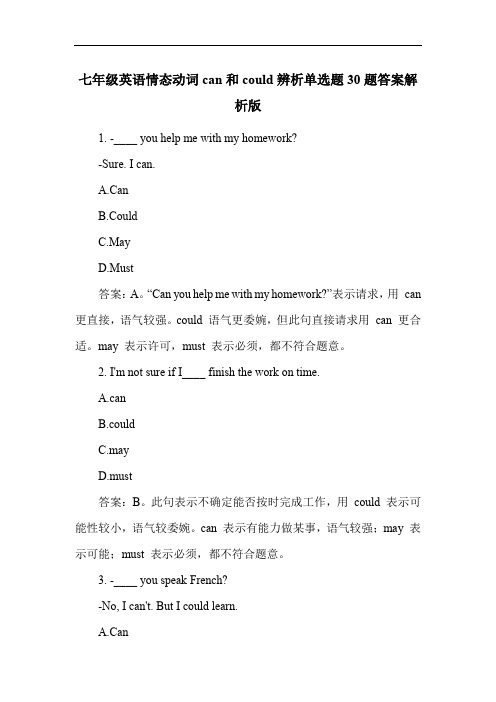
七年级英语情态动词can和could辨析单选题30题答案解析版1. -____ you help me with my homework?-Sure. I can.A.CanB.CouldC.MayD.Must答案:A。
“Can you help me with my homework?”表示请求,用can 更直接,语气较强。
could 语气更委婉,但此句直接请求用can 更合适。
may 表示许可,must 表示必须,都不符合题意。
2. I'm not sure if I____ finish the work on time.A.canB.couldC.mayD.must答案:B。
此句表示不确定能否按时完成工作,用could 表示可能性较小,语气较委婉。
can 表示有能力做某事,语气较强;may 表示可能;must 表示必须,都不符合题意。
3. -____ you speak French?-No, I can't. But I could learn.A.CanB.CouldC.MayD.Must答案:A。
问句询问现在是否会说法语,用can。
could 表示过去的能力或委婉的请求等,此处不合适。
may 表示许可,must 表示必须,都不符合题意。
4. He____ play basketball very well when he was young.A.canB.couldC.mayD.must答案:B。
表示过去的能力用could。
can 表示现在的能力;may 表示可能;must 表示必须,都不符合题意。
5. -____ I borrow your pen?-Sure. Here you are.A.CanB.CouldC.MayD.Must答案:A。
“Can I borrow your pen?”表示请求,用can 更直接。
could 语气更委婉,但此句直接请求用can 更合适。
情态动词can,could,may,might及练习

精品PPT
could的语气比 can委婉,但答语 中不用 could而用 can.
精品PPT
• 3. ---Mr. Brown is on time for everything .How can he be so late for the important meeting?
• Can 表示“惊讶,疑心,不相信〞 的态度〔否认句和疑问句〕
精品PPT
can在肯定句中表示“有时候会〞 注 指一种客观的可能性.常用来说明人或事物特征
• 1.Accident can happen on such rainy days. •2.Even experienced teachers can make mistakes. 3.Children can be naughty.
• A. may
B might
只有宾语从句中 might表过去的 可能性
精品PPT
• 4〕-- Why hasn’t Jack come back yet?____ anything have happened to him?
• ---- I am not sure , but I guess something ________ happened.
精品PPT
• 2) 表 推测 “可能〞,用于肯定句和否认句
• 1〕 He _m__a_y_\_m__ig__h_t_ (可能)
come today, but I’m not sure.
(完整版)can、could用法练习
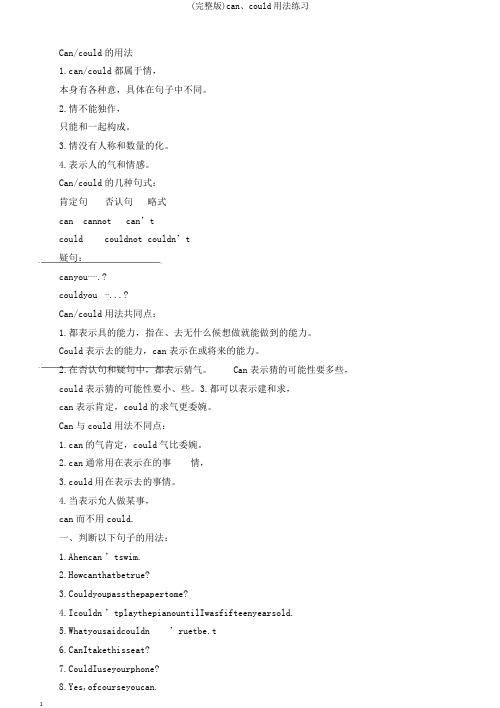
Can/could的用法1.can/could都属于情,本身有各种意,具体在句子中不同。
2.情不能独作,只能和一起构成。
3.情没有人称和数量的化。
4.表示人的气和情感。
Can/could的几种句式:肯定句否认句略式can cannot can’tcould couldnot couldn’t疑句:canyou⋯⋯.?couldyou ⋯...?Can/could用法共同点:1.都表示具的能力,指在、去无什么候想做就能做到的能力。
Could表示去的能力,can表示在或将来的能力。
2.在否认句和疑句中,都表示猜气。
Can表示猜的可能性要多些,could表示猜的可能性要小、些。
3.都可以表示建和求,can表示肯定,could的求气更委婉。
Can与could用法不同点:1.can的气肯定,could气比委婉。
2.can通常用在表示在的事情,3.could用在表示去的事情。
4.当表示允人做某事,can而不用could.一、判断以下句子的用法:1.Ahencan ’tswim.2.Howcanthatbetrue?3.Couldyoupassthepapertome?4.Icouldn ’tplaythepianountilIwasfifteenyearsold.5.Whatyousaidcouldn ’ruetbe.t6.CanItakethisseat?7.CouldIuseyourphone?8.Yes,ofcourseyoucan.1二、选择题1.Atthattimewethoughtthestory_____notbetrue.A)couldB)must C)can2.You___theworkbe tterinthefuture.A)coulddidB)cando C)coulddo3.Theroomisdirty;it____cleaned.A)can‘tbeB)couldn’tbeC)mustn'tbe4.Mary____myletter,becausesheisworringaboutitnow .A)shouldreceive B)can’treceiveC)couldn'treceive5.AnEnglishmanwho____notspeakChi neseinChina.A)mustB)could C)can6.MrWang______writelastyear,hewasillforthreeyears.’’’t7.–Whoisthemanoverthere?IsitMrLi?--No,it______behim.MrLiismuchtaller.’’t8.CouldIseathere?---Yes,ofcourseyou_______.三、按要求完成句子Hecanrideabike.〔改一般疑问句和否认句,并作肯定和否认答复〕一般疑问句_________________________________________否认句_________________________________________肯定答复______________否认答复______________2.你会弹吉他吗?_____you___________guitar?3.两年前我不会骑自行车。
could练习题

Could练习题一、情态动词Could表示能力1. 请用could完成下列句子,表示过去的能力:a) When I was young, I _______ (swim) in the river.b) My brother _______ (play) the piano very well.c) She _______ (sing) beautifully when she was a child.2. 请用could完成下列句子,表示现在的能力:a) I _______ (not) (run) a marathon.b) He _______ (not) (speak) French.c) They _______ (cook) delicious meals.二、情态动词Could表示可能性3. 请用could完成下列句子,表示现在或将来的可能性:a) It _______ (rain) tomorrow.b) She _______ (be) at the library now.c) They _______ (not) (find) the lost dog.4. 请用could完成下列句子,表示过去可能发生的事情:a) He _______ (lose) his way in the forest.b) She _______ (meet) an old friend in the street.c) They _______ (not) (find) the treasure.三、情态动词Could表示请求和允许5. 请用could完成下列句子,表示请求:a) Could you _______ (lend) me your dictionary?c) Could you _______ (help) me with my homework?6. 请用could完成下列句子,表示允许:a) You could _______ (not) (enter) the room without permission.b) They could _______ (not) (play) loud music after 10 p.m.c) He could _______ (take) a day off next week.四、情态动词Could表示建议7. 请用could完成下列句子,表示建议:a) You could _______ (try) this new restaurant.b) He could _______ (consider) changing his job.c) We could _______ (go) to the beach this weekend.五、情态动词Could表示惊讶8. 请用could完成下列句子,表示惊讶:a) Could you believe it? He _______ (pass) the exam with flying colors!b) I couldn't believe that she _______ (not) (tell) me the truth.c) They couldn't _______ (imagine) that the project would be a success.六、情态动词Could表示推测9. 请用could完成下列句子,表示推测:a) She could _______ (be) at the airport now.b) He could _______ (have) finished his work already.c) They could _______ (not) (have) known about the surprise party.七、情态动词Could与其他词搭配10. 请用could和下列动词搭配,完成下列句子:a) Could you please _______ (turn) down the volume?b) Could I _______ (borrow) your pen?c) Could he _______ (join) us for dinner tonight?一、情态动词Could表示能力(续)11. 请用could完成下列句子,表示过去的能力:a) My grandmother _______ (knit) beautiful sweaters when she was young.b) He _______ (ride) a bicycle before he was tenyears old.c) They _______ (not) (climb) the mountain in one day.12. 请用could完成下列句子,表示现在的能力:a) She _______ (drive) a car, but she doesn't have a license.b) He _______ (not) (dance) well, but he's taking lessons.c) They _______ (paint) pictures, but they're not professional artists.二、情态动词Could表示可能性(续)13. 请用could完成下列句子,表示现在或将来的可能性:a) It _______ (snow) this weekend if the weather forecast is correct.b) She _______ (not) (attend) the meeting if she's feeling unwell.c) They _______ (miss) the train if they don't leave soon.14. 请用could完成下列句子,表示过去可能发生的事情:a) He _______ (visit) the museum while he was in the city.b) She _______ (meet) her idol at the concert.c) They _______ (not) (hear) the alarm because they were asleep.三、情态动词Could表示请求和允许(续)15. 请用could完成下列句子,表示请求:a) Could you _______ (pass) the salt, please?b) Could I _______ (have) a glass of water?c) Could you _______ (help) me carry this box?16. 请用could完成下列句子,表示允许:a) You could _______ (not) (wear) that shirt to the office.b) They could _______ (not) (bring) their pets to the park.c) He could _______ (take) a break if he feels tired.四、情态动词Could表示建议(续)17. 请用could完成下列句子,表示建议:a) You could _______ (read) this book; it's very interesting.b) He could _______ (take) a vacation to relax.c) We could _______ (organize) a charity event to raise funds.五、情态动词Could表示惊讶(续)18. 请用could完成下列句子,表示惊讶:a) Could you believe that she _______ (not) (recognize) her own son?b) I couldn't imagine that he _______ (quit) his job without any notice.c) They couldn't believe that the restaurant _______ (close) down after 20 years.六、情态动词Could表示推测(续)19. 请用could完成下列句子,表示推测:a) She could _______ (be) looking for her lost keys.b) He could _______ (have) forgotten to turn off the lights.c) They could _______ (not) (have) noticed the sign that said "No Entry."七、情态动词Could与其他词搭配(续)20. 请用could和下列动词搭配,完成下列句子:a) Could you _______ (explain) this math problem to me?b) Could I _______ (reserve) a table for four?c) Could he _______ (assist) us with the project?八、情态动词Could表示假设21. 请用could完成下列句子,表示假设:a) If I _______ (be) a millionaire, I could _______ (travel) around the world.b) If she _______ (not) (have) a car, she could_______ (not) (get) to work on time.c) If they _______ (try) harder, they could _______ (succeed) in their business.九、情态动词Could表示委婉批评22. 请用could完成下列句子,表示委婉批评:a) You could _______ (try) to be more punctual.b) He could _______ (not) (leave) his clothes on the floor.c) They could _______ (consider) being more considerate of others' feelings.八、情态动词Could表示假设(续)23. 请用could完成下列句子,表示假设:a) If she _______ (be) taller, she could _______ (play) professional basketball.b) If they _______ (invest) in new technology, they could _______ (increase) their productivity.c) If I _______ (have) more time, I could _______ (learn) a new language.24. 请用could完成下列句子,表示假设:a) If he _______ (not) (be) so shy, he could _______ (make) more friends.b) If we _______ (have) a bigger budget, we could_______ (expand) our business.c) If she _______ (not) (worry) so much, she could _______ (enjoy) life more.九、情态动词Could表示委婉批评(续)25. 请用could完成下列句子,表示委婉批评:a) You could _______ (think) before you speak to avoid misunderstandings.b) He could _______ (not) (ignore) the importance of deadlines.c) They could _______ (try) to be more cooperative with their colleagues.十、情态动词Could表示期望26. 请用could完成下列句子,表示期望:a) We could _______ (see) a improvement in sales if we implement these strategies.b) He could _______ (achieve) better results if he studies harder.c) She could _______ (reach) her goals if she persists in her efforts.十一、情态动词Could表示预见27. 请用could完成下列句子,表示预见:b) With the increasing population, the city could_______ (experience) traffic congestion in the future.c) If the weather gets worse, we could _______ (cancel) the outdoor event.十二、情态动词Could表示偏好28. 请用could完成下列句子,表示偏好:a) I could _______ (prefer) to stay at home rather than go out on a rainy day.b) He could _______ (choose) to spend his weekends hiking in the mountains.c) They could _______ (decide) to travel train instead of plane.十三、情态动词Could表示推测的未来情况29. 请用could完成下列句子,表示推测的未来情况:a) It could _______ (happen) that we will have a new manager the end of the month.b) She could _______ (end) up being the lead singer of the band.c) They could _______ (wind) up moving to a different city for their job.十四、情态动词Could表示对过去情况的推测30. 请用could完成下列句子,表示对过去情况的推测:a) He could _______ (have) missed the train, which is why he was late.b) She could _______ (have) forgotten her keys, which is why she couldn't get into her apartment.c) They could _______ (have) lost their way, which is why they arrived so late.十五、情态动词Could表示对现在情况的推测31. 请用could完成下列句子,表示对现在情况的推测:a) He could _______ (be) at the gym right now.b) She could _______ (be) working on her project.c) They could _______ (be) planning their next vacation.十六、情态动词Could表示对将来情况的推测32. 请用could完成下列句子,表示对将来情况的推测:a) It could _______ (rain) tomorrow, so bring an umbrella.b) He could _______ (not) (be) available for the meeting next week.c) They could _______ (延期) their trip if the situation doesn't improve.十七、情态动词Could表示假设性建议33. 请用could完成下列句子,表示假设性建议:a) If we _______ (implement) these changes, we could_______ (improve) our customer service.b) If she _______ (attend) more workshops, she could_______ (enhance) her skills.c) If they _______ (coordinate) better, they could_______ (achieve) their targets more efficiently.34. 请用could完成下列句子,表示假设性建议:a) If you _______ (reduce) your sugar intake, youcould _______ (lose) weight.b) If he _______ (join) a gym, he could _______ (increase) his fitness level.c) If they _______ (invest) in new software, theycould _______ (streamline) their processes.十八、情态动词Could表示对过去行为的假设35. 请用could完成下列句子,表示对过去行为的假设:a) If I _______ (study) harder, I could _______ (have) passed the exam.b) If she _______ (not) (ignore) the warning, shecould _______ (have) avoided the accident.36. 请用could完成下列句子,表示对过去行为的假设:a) If he _______ (listen) to his parents, he could_______ (not) (get) into trouble.b) If we _______ (start) earlier, we could _______ (have) finished the project on time.c) If they _______ (plan) better, they could _______ (have) avoided the delay.十九、情态动词Could表示对现在情况的假设37. 请用could完成下列句子,表示对现在情况的假设:a) If she _______ (not) (be) so busy, she could_______ (take) up a hob.b) If he _______ (have) more confidence, he could_______ (apply) for better positions.c) If they _______ (not) (waste) so much time, they could _______ (be) more productive.38. 请用could完成下列句子,表示对现在情况的假设:b) If he _______ (not) (be) in such a hurry, he could _______ (enjoy) the journey.c) If they _______ (coordinate) their efforts, they could _______ (reach) their goals faster.二十、情态动词Could表示对将来情况的假设39. 请用could完成下列句子,表示对将来情况的假设:a) If we _______ (continue) to innovate, we could_______ (dominate) the market.b) If she _______ (not) (retire), she could _______ (contribute) more to the team.c) If they _______ (expand) their operations, they could _______ (increase) their revenue.40. 请用could完成下列句子,表示对将来情况的假设:a) If he _______ (learn) a new language, he could_______ (find) more job opportunities.b) If we _______ (reduce) our expenses, we could_______ (afford) a bigger office.c) If they _______ (invest) in research and development, they could _______ (create) groundbreaking products.二十一、情态动词Could表示对过去情况的假设性推测41. 请用could完成下列句子,表示对过去情况的假设性推测:a) If she _______ (not) (leave) her phone at home, she could _______ (have) received the important call.b) If he _______ (not) (oversleep), he could _______ (have) made it to the meeting on time.c) If they _______ (not) (ignore) the signs, they could _______ (have) prevented the disaster.42. 请用could完成下列句子,表示对过去情况的假设性推测:a) If I _______ (not) (lose) my keys, I could _______ (have) avoided being late.b) If she _______ (not) (miss) the train, she could _______ (have) arrived earlier.答案:一、情态动词Could表示能力1. could swim, could play, could sing2. can't run, can't speak, can cook二、情态动词Could表示可能性3. could rain, could be, couldn't have4. could have lost, could have met, couldn't have found三、情态动词Could表示请求和允许5. could lend, could use, could help6. couldn't enter, couldn't play, could take四、情态动词Could表示建议7. could try, could consider, could go五、情态动词Could表示惊讶8. couldn't believe, couldn't believe, couldn't imagine六、情态动词Could表示推测9. could be, could have finished, couldn't have known七、情态动词Could与其他词搭配10. please turn down, borrow, join八、情态动词Could表示能力(续)11. could knit, could ride, couldn't climb12. can drive, couldn't dance, can paint九、情态动词Could表示可能性(续)13. could snow, couldn't attend, could miss14. could have visited, could have met, couldn't have heard十、情态动词Could表示请求和允许(续)15. could pass, could have, could help16. couldn't wear, couldn't bring, could take十一、情态动词Could表示建议(续)17. could read, could take, could organize十二、情态动词Could表示惊讶(续)18. couldn't believe, couldn't imagine, couldn't believe十三、情态动词Could表示推测(续)19. could be looking, could have forgotten, couldn't have noticed十四、情态动词Could表示假设20. were, could travel, didn't have, couldn't get, could try, could increase十五、情态动词Could表示委婉批评21. could think, couldn't ignore, could try十六、情态动词Could表示期望22. could see, could achieve, could reach十七、情态动词Could表示预见23. could face, could experience, could cancel十八、情态动词Could表示偏好24. would prefer, would choose, would decide十九、情态动词Could表示推测的未来情况25. could happen, could end up, could wind up二十、情态动词Could表示对过去情况的推测26. could have missed, could have forgotten, could have lost二十一、情态动词Could表示对现在情况的推测27. could be, could be, could be二十二、情态动词Could表示假设性建议28. implemented, could improve, attended, could enhance, coordinated, could achieve二十三、情态动词Could表示对过去行为的假设29. studied, could have passed, ignored, could have avoided, acted, could have saved二十四、情态动词Could表示对现在情况的假设30. weren't, could take, had more confidence, could apply, wasted, could be二十五、情态动词Could表示对将来情况的假设31. lived, could save, weren't, could enjoy, coordinated, could reach二十六、情态动词Could表示对将来情况的假设32. continued, could dominate, didn't retire, could contribute, expanded, could increase二十七、情态动词Could表示对过去情况的假设性推测33. not left, could have received, not overslept, could have made, not ignored, could have prevented二十八、情态动词Could表示对过去情况的假设性推测。
